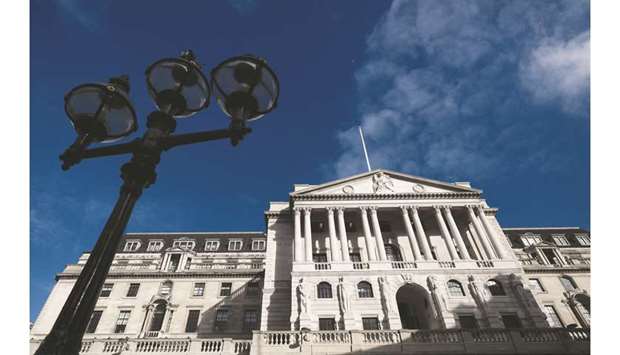The Bank of England has left its main interest rate at 0.75%, it said yesterday after a regular meeting and before next month’s UK general election to unlock Brexit.
The central bank also upgraded its UK growth forecast to 1.4% in 2019 but downgraded 2020 guidance to 1.2%.
The new forecasts, which assume that Britain leaves the European Union with a deal on January 31, contrasted with the Bank of England’s (BoE) prior predictions of 1.3% for both years.
The bank’s Monetary Policy Committee (MPC) voted 7-2 to hold borrowing costs, according to minutes of the rate-setting meeting that took place on Wednesday.
“Two members preferred a 25 basis point cut in bank rate at this meeting,” the minutes read.
The pair judged that “some extra stimulus was needed now to ensure a sustained return of inflation to the target”. The minutes, meanwhile, noted “downside risks to the MPC’s projections from a weaker world outlook and from more persistent Brexit uncertainties affecting corporate and household spending”.
They added: “For the majority of members of the committee, the existing stance of monetary policy was appropriate at this meeting.
“Although the global outlook had deteriorated further, recent UK economic data had not, on the whole, surprised to the downside.”
Outgoing BoE governor Mark Carney, partaking in his penultimate rate decision, warned over the gloomy global outlook.
“At a time when news about the political and economic outlook seems to move hourly, it’s important to step back and look at the bigger picture,” Carney told a press conference.
“Globally, that big picture has darkened,” said the Canadian, who steps down at the end of January having extended his tenure twice owing to Brexit turmoil.
His successor has yet to be announced.
Two external Monetary Policy Committee members, Michael Saunders and Jonathan Haskel, cast the first votes for lower rates, Reuters reported.
Peter Dixon, an economist at Commerzbank, said he did not expect the majority of the MPC to back a rate cut soon. “I think it makes sense to keep their power dry until we see where we are, if and when Brexit decision actually takes place, because if it goes wrong, the Bank is going to need all the ammunition it can get,” he said.
Saunders and Haskel said their change in stance was driven by reduced job vacancies that suggested the labour market was turning, and downside risks from the world economy and Brexit.
For the others, Britain’s economy had not performed much differently than they had expected three months ago but they showed a new openness to cutting rates if things soured. “If global growth failed to stabilise or if Brexit uncertainties remained entrenched, monetary policy might need to reinforce the expected recovery in UK GDP growth and inflation,” they said in a summary of their policy discussion.
They also softened long-standing language on the medium-term need for limited and gradual rate hikes, saying they “might” rather than “would” be necessary.
The BoE as a whole painted a darker picture for Britain’s economy over the next three years, predicting it will grow 1% less over the period than it had forecast in August.
About three quarters of this was due to a weaker global economy and strengthening in sterling since the risk of a no-deal Brexit had diminished, but part of it reflected Johnson’s Brexit plans.
The BoE now assumes Britain will strike a trade deal that leads to new customs checks and puts up barriers to exports of financial and legal services.
Growth would have been forecast to be weaker still, if the government had not announced major fiscal stimulus in September.
Inflation, currently 1.7%, is forecast to drop to 1.2% in the middle of next year due to lower oil prices and regulatory caps on electricity and water bills.
But over the next couple of years, the BoE still sees growth picking up from 1.4% this year to 2.0% in 2022.
The 2022 growth rate is above Britain’s long-term trend and would push inflation back above the BoE’s 2% goal, the central bank said.
The BoE’s main task is use interest rates as a tool to keep 12-month UK inflation close to a government-set target of 2.0%.
The inflation rate held at a three-year low of 1.7% in September.
Earlier yesterday, Britain’s Conservative government cancelled a planned release of its own updated economic forecasts just one hour before publication had been due.
“This will no longer go ahead as the Cabinet Secretary has concluded that this would not be consistent with the Cabinet Office’s general election guidance,” the Office for Budget Responsibility said in a statement.
The Conservatives and the main opposition Labour Party yesterday each promised billions of pounds of investment for hospitals, schools and infrastructure as they seek to woo austerity-weary voters ahead of the December 12 vote.
Prime Minister Boris Johnson’s Conservatives confirmed an end to a decade of belt-tightening with new plans to borrow to invest, while attacking the rival Labour party for pledging even greater largesse.

The Bank of England headquarters in the City of London. The BoE upgraded its UK growth forecast yesterday to 1.4% in 2019 but downgraded 2020 guidance to 1.2%.


